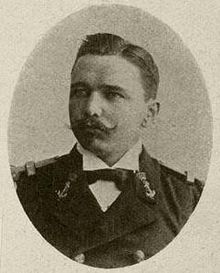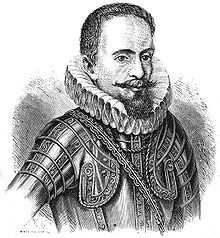Netherlands

Johan Niehof
1618 - 1672
Place of Birth: Uelsen
Biography: Johan Nieuhof was born in Uelsen, a town in the county of Bentheim, Lower Saxony, sitting just across the Dutch-German border. His father (originally from Zwolle) was mayor of the town, and was later succeeded by one of Johan's brothers and brother-in-law. By the grace of Cornelis Jan Witsen, a leading figure within the Dutch West India Company (or "WIC"), Nieuhof left for Dutch Brazil in 1640 as a reserve officer-candidate. From then on, barring two short family visits in 1658 and 1671, he spent all the rest of his life abroad.
Legacy: He wrote An embassy from the East-India Company containing the written account of this journey.

Johannes Gijsbert Willem Jacobus Eilerts de Haan
1865 - 1910
Place of Birth: Noordwolde
Biography: Eilerts de Haan was the third son of Frederick Anneus Eilerts de Haan who was then minister was in the Frisian Noordwolde. Around 1868, the family of the southern part of Friesland Ternaard moved to the north of that province when his father was pastor there.
He was educated at the Royal Naval Institute in Willemsoord, Den Helder. Johan Eilerts de Haan's career began in September 1882 as a midshipman third class. From 1886 to 1891 he served as a midshipman first class first in the West Indies, then went on a sailing voyage with the Nautilus and spent three years of the Dutch East Indies during which he was (1889), Commander 2nd class. In 1895 he again went for three years to the East Indies. From 1900 he was second in command for two years in the Marine Department and in 1902 he was promoted to lieutenant 1st class. In 1903 Eilerts de Haan was seconded to the observatory in Utrecht and in October of that year he went again to the East Indies, where he served for three years.
Legacy: Eilerts de Haan Nature Park in Suriname is named for him.

Jacob van Heemskerk
1567 - 1607
Place of Birth: Amsterdam
Biography: Jacob van Heemskerk was born in Amsterdam in 1567. He is described as having delicate feature, large brown eyes, a thin high nose, fair hair and beard, and a soft gentle expression. Under a quiet exterior and plain dress were a daring nature and indomitable ambition for military and naval distinction.
Legacy: commanding the Dutch fleet at the Battle of Gibraltar.

Justus Carl Hasskarl
1811 - 1894
Place of Birth: Kassel
Biography: Justus Carl Hasskarl was born in Kassel in the Kingdom of Westphalia. In his earlier life he studied at a plant nursery in Poppelsdorf in 1827. And later in 1834 he studied Natural History while at the same time, prepared himself for an expedition to the tropics.
In 1836, he traveled to Java and tried to make a living through his knowledge in Physics and Medicine, with little success. Subsequently he sent a request to the Governor general to work in 's Lands Plantentuin and a year later he was appointed as assistant curator.With director Johannes Elias Teijsmann, they rearranged their crops to taxonomic families, which would result in the displacement of many specimens in the botanical garden. Together they organized expeditions to various parts of modern Indonesia and expand the number of plants collection in the Botanic Garden. Hasskarl also proposed starting a library (Bibliotheca Bogoriensis) which was opened in 1842 and Herbarium Bogoriense in 1844.
In 1852, the Netherlands government sent him to Lima and in early 1853, Justus made an expedition to the interior of Peru and even reaching the eastern border of Lake Titicaca, where he gathered Cinchona trees for Malaria treatment. In 1854 he sent his collections of seeds and specimens back to the Netherlands and introduced Cinchona trees to Java, the extract of the tree would later be used to make quinine. However due to his worsening health he had to return to Netherlands in 1856.
Later he participated in examining and describe the Commelinaceae of Georg August Schweinfurth's Abyssinian plant collections and also worked on several plant families, such as Cyathea junghuhniana in Leiden.
In 1855 he became correspondent of the Royal Netherlands Academy of Arts and Sciences, he resigned in 1859.
Legacy: The gender Hasskarlia Baill. in the family Euphorbiaceae is named in his honor.

Robert Jacob Gordon
1743 - 1795
Place of Birth: Doesburg, Gelderland
Biography: Robert Jacob Gordon was the son of Maj. General Jacob Gordon of the Scots Brigade (1572–1782) in the service of the Netherlands. Although of Scottish descent, Robert Gordon's allegiance and service lay with the Netherlands. He joined the Dutch Light Dragoons as a cadet in 1753 and enrolled at the University of Harderwijk in 1759. Here he studied in the humanities and soon proved to be of exceptional intelligence with diverse interests. He served at first with the Scots Brigade and later joined the Dutch East India Company, rising to the rank of colonel and commanding the Cape garrison between 1780 and 1795 and lived in the manor house known as Schoonder Sigt. He went on more expeditions than any other 18th-century explorer of southern Africa. Of the six journeys he undertook, only four between 1777 and 1786 are covered by journals discovered in 1964. He was responsible for naming the Orange River, introducing Merino sheep to the Cape Colony and for the discovery of the remains of Bartolomeu Dias's padrão at Kwaaihoek in 1786. In addition to French, Dutch and English, he spoke Hottentot and Xhosa.
Legacy: As commander of the garrison, Gordon was responsible for the Cape's defense.
No comments:
Post a Comment